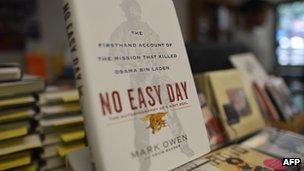Bin Laden raid book offers rare insight
- Published
- comments

The killing of Osama Bin Laden affected those who were responsible in different ways.
For "Jen", as the CIA analyst who tracked down the al-Qaeda leader is referred to in No Easy Day, a US Navy commando's first-hand account of the raid, it resulted in floods of tears.
"She'd spent half a decade tracking this man... now there he was at her feet".
For "Mark Owen" the pseudonymous US Navy Seal who has annoyed the Pentagon so much by publishing that expose, it contributed to a decision to "step off the speeding train" of high-end special operations.
He had been part of the secret Tier 1 counter-terrorist operations for 10 years, taking part in something like 500 operational raids.
Nobody in Washington would have minded if Mr Owen had drifted off quietly into corporate security work or one of the other paths often trodden by former special operators. But he decided to write No Easy Day.
I don't imagine he would ever have considered doing so if Bin Laden were still at large, and his decision to publish is a telling indicator of how far the climate for the discussion of the al-Qaeda threat - and the largely secret methods used to combat it - has been changed by the death of the organisation's founding leader.
The offensive operations carried out since 9/11 - mainly in Iraq and Afghanistan - have been run by several thousand intelligence people and special operators who have been bound by a vow of silence.
In the case of the UK contribution to this, mainly the SAS and SBS, a regime of non-disclosure agreements and official secrecy has been used in an attempt to stifle discussion of such actions.
Service to openness
When writing Task Force Black, an account of British special operations in Iraq, I was involved in long, difficult and expensive (since they were held under the threat of legal action) discussions with Whitehall.
No British operator has yet managed to publish a first-hand account of these raids and the public debate is all the poorer for that fact.
In Mr Owen's case the fact that the Bin Laden raid was of such enormous importance, and therefore market potential, along with the perceived vanquishing of al-Qaeda all seem to have combined to propel him towards publication without clearance of his manuscript.
What emerges is a vivid portrait of the world in which these people lived, going out on raids so many times to kill or capture suspected terrorists that they all began to merge.
In the years before 9/11 a Seal or an SAS trooper would have been lucky to take part in five operational missions during an entire career. Now there is a generation of people like Mr Owen who have done a hundred times that many.
The approach has been to mount so many raids against militant networks that they are taken down faster than they can regenerate.
The process of "Find-Fix-Finish-Exploit" has been applied to thousands of people. In other words: working out their place in the insurgency; locating them at a particular time and spot; turning up - usually in the middle of the night - to take them; harvesting whatever information they might have through interrogation or the analysis of their laptops, phones or other possessions.
Mr Owen appears to think that this last aspect of the Bin Laden operation was the weakest. He says that because the helicopters circling Bin Laden's compound were low on fuel, that the assault force had to leave before a really thorough job had been done hoovering up the al-Qaeda leader's personal archive.
He also argues that a growing amount of red tape was hampering their operations in Afghanistan at the time he decided to hang up his silenced assault rifle. Those pressures - from an Afghan government fed up with what it says are the wrong houses being hit, and innocent families being killed - have emerged in the public domain before.
But the special operators' reaction to them has not.
There are signs that the special operations campaign in Afghanistan, notwithstanding the Bin Laden raid in neighbouring Pakistan, has been markedly less successful in reducing the wider pattern of violence than it was in Iraq. There are many reasons for this, but my own assessment would be that Afghan red tape does not explain it.
In writing his book, Mr Owen though has not attempted much strategic analysis. His book, understandably enough, focuses on the door-kickers' view, the dedication of those willing to go up against suicide bombers and extremist leaders, as well as the losses suffered by his comrades.
He has done a service to openness and accountability in writing it. The Pentagon, however, is considering legal action.
It will be interesting to see, once the election is over (and with it the accusations that the Obama administration has connived with damaging leaks in order to boost its re-election chances) whether it goes through with it.
- Published23 August 2012
- Published10 September 2012